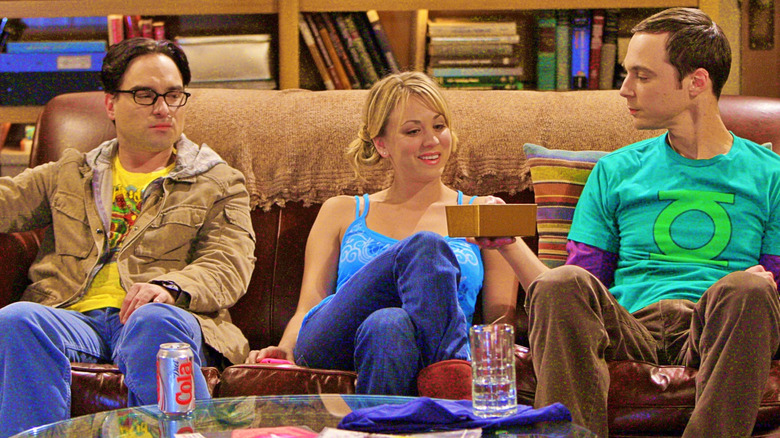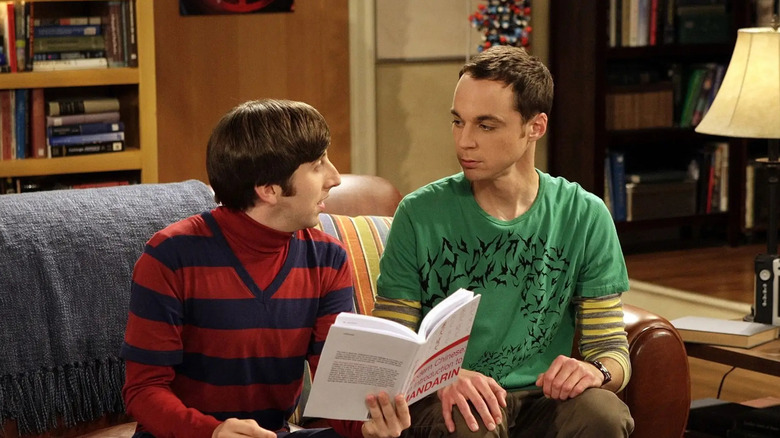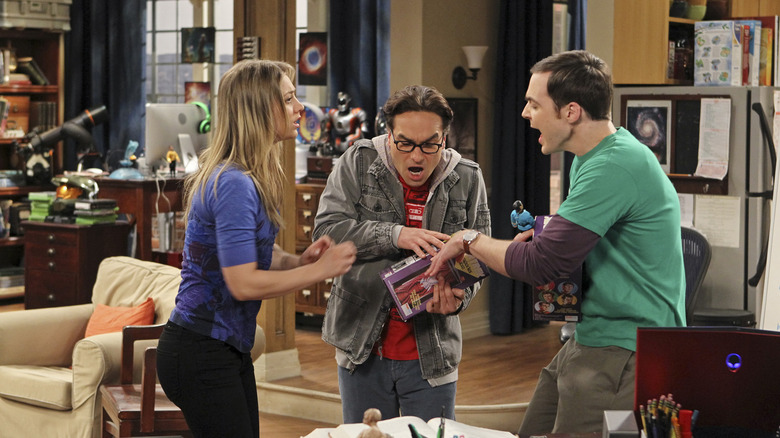How The Big Bang Theory Survived The 2007-08 Writers' Strike
We may receive a commission on purchases made from links.
From November 2007 to February 2008, Hollywood's output came to a screeching halt over a Writers Guild of America strike, affecting both coastal factions of the creative guild ... and according to Jessica Radloff's book about "The Big Bang Theory," this strike was, somehow, a good thing for Chuck Lorre and Bill Prady's series.
As Radloff and the show's cast and crew tell us in her 2022 oral history "The Big Bang Theory: The Definitive, Inside Story of the Epic Hit Series," the strike happened just eight episodes into the show's very first season, but when productions shut down across California and New York, something interesting happened. Because the network had to show something to audiences during the strike, they just ... kept showing those first eight episodes.
"In my opinion, the strike was one of the most accidentally fortuitous things that could have happened to us because CBS re-aired our first eight episodes over and over," Jim Parsons, who led the series as Sheldon Cooper for twelve years and seasons, told Radloff. Lorre agreed, saying, "In a way, it was an early Netflix experiment. The show was always available to be seen."
"Episodes were being shown on flights, and it got us a lot of traction," Kaley Cuoco, who played Penny from the pilot to the series finale, recalled. "I started having people come up to me to say, 'Oh my God, I watched some episodes on my flight home the other day and it was so funny!' People that wouldn't have looked twice kind of got forced to watch it in a way."
Ultimately, as Radloff tells the reader, not only was "The Big Bang Theory" renewed for a second season, but the renewal happened super quickly because that eight-episode run was so big on CBS. "Every renewal was a moment of pure joy, but that renewal came in very early," Prady revealed. "It was very clearly related to the success CBS had airing those first eight episodes during the strike. There's no other logical explanation." Nina Tassler, the former president of entertainment at CBS, confirmed Prady's belief: "By the time we did come back, the fan base was beginning to build up and viewership had increased."
Two Big Bang Theory stars bonded during the strike — and 'ate their feelings'
Apparently, some cast members on "The Big Bang Theory" made the best of their experience during strike in their own way. Jim Parsons and Simon Helberg talked to Jessica Radloff about how the two of them, along with Helberg's wife, actress and director Jocelyn Towne, and Parsons' then-boyfriend, now-husband Todd Spiewak, basically took over Los Angeles and had a great time despite their shared job uncertainty. (This pairing is also particularly funny because Helberg's character, Howard Wolowitz, frequently butts heads with Sheldon, mostly because Sheldon is deeply dismissive over the fact that Howard doesn't have a PhD.)
"It was a really weird but magical time," Parsons recalled fondly. "We were in limbo and we didn't know what was going to happen, exactly, but we weren't necessarily down about it; we were just kind of running around town, and Simon and his wife, Jocelyn, was the first close friendship that Todd and I had in [Los Angeles]. We had the holidays through that writers' strike and we all bought each other way too many gifts. We even had a family Christmas Eve festival! We were all very much in love."
Helberg, who spoke more to the utter anxiety of whether or not the project he and Parsons had just booked would survive a massive, industry-wide strike, still made some jokes about how the two of them spent their time. "Jim and I were just eating our feelings, because we didn't know if or when the show was going to come back," Helberg said. "We did start to hear that when CBS was rerunning the show, the ratings were going up, so that was exciting. But still, it took a while. The insecurity of getting canceled is just always there. I remember it taking me such a long time to put a nail on the wall of my dressing room and hang up a picture. Once we had some job security and the show was doing well, I hung up a picture of Jim and I eating." Wait, did Helberg really do that? No, he did not: "I'm kidding," he admitted.
Chuck Lorre and his entire team hit the ground running when the 2007-08 writers' strike concluded
Despite the unexpected pause partway through the first season of "The Big Bang Theory," Chuck Lorre, Bill Prady, and members of the show's creative team — including writer and executive producer Steve Molaro — decided that they would complete the show's inaugural season as soon as they were allowed to. "The strike helped make the show a hit, without a doubt," Molaro admitted. "But many shows threw in the towel, like, 'We'll just start again in season two.' And Chuck said, 'Nope, we're gonna come back and make as many episodes as we possibly can.' Only two new shows came back — I believe ours and 'Chuck.' And since a lot of people watched us in reruns, they were excited to see us come back with new episodes, not to mention that there wasn't a lot else out there. That combination really kind of set the show's foundation with the audience."
Clearly, this gambit worked. As Jim Parsons recalled, "And then we came back to even better ratings. We didn't jump from zero to eighty, so it was a gradual enough experience for me that by the time we were being noticed, we had done so much work already."
"The first season of a show is a whitewater raft ride down a river with no break," Prady mused, remembering how it all went down when they went back to work. "You do not get a moment to sit quietly on the banks on the river and think. But now we had that chance. When we went back to work, it was very clearly that the show had marinated in everyone's mind. The things that ultimately would be hallmarks of the show had occurred to everybody, and how relationships would work among the characters, what kinds of stories worked better, etc., were evident. There was a very different energy to the writing of the show after the writers' strike."
As for Lorre, he was unequivocal about his mindset at the time. "I was relentless," he remembered. We weren't supposed to write during the writers' strike, so we couldn't stockpile scripts. That was against the rules. But I remember just being maniacal about it when we came back. We produced nine episodes in two months. My mantra was, 'We. Are. Not. Going. To. Let. This. Thing. Fail."
Obviously, "The Big Bang Theory" didn't fail — and you can watch all twelve seasons of the massively popular sitcom on Max now.


